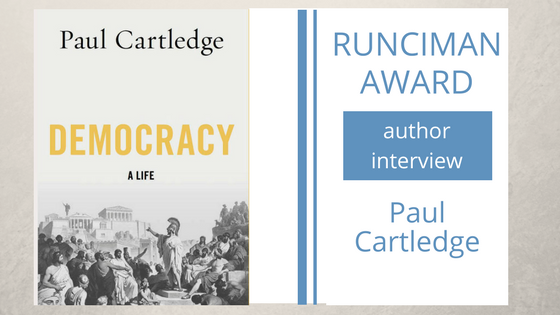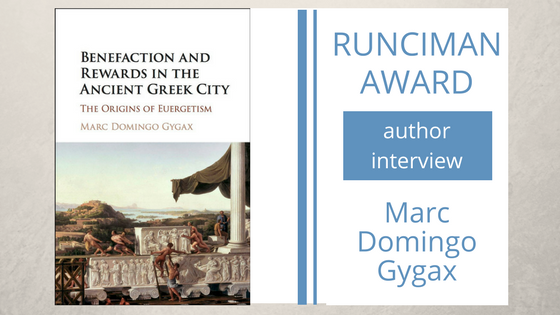Throughout this book we have explored the inner stance of Greek worshippers, such as they appear in individual and varied guises of the pre-Platonic sources, rather than that of ‘the Greek worshipper’ as a generalized amalgam. The outcomes, we believe, are several.
 RuncimanAward
RuncimanAward
An interview with Paul Cartledge, author of Democracy: A Life
Thank you for taking the time to answer our questions, Paul.
Can we start with your motivation for writing this book? Was it your knowledge of the ancient world and Greece’s political systems, or concerns about the modern world?
A combination. I think I’m a kind of ‘natural’ democrat in the sense of being (an) anti-elitist egalitarian, but it wasn’t until I was a student first at the University of California and then Oxford that I got a chance to show my true democratic colours
An excerpt from Paul Cartledge’s entry, Democracy: A Life
Every schoolchild knows that it was the ancient Greeks who invented democracy. But first it must always be remembered that there were some one thousand ancient Greek political entities, often very different, always radically self-differentiated, in the extended and diverse ancient Greek world of Hellas between say 500 and 300 BCE, when demokratia emerged, rose, peaked, and declined or was destroyed.
An interview with Marc Domingo Gygax, author of Benefaction and Rewards in the Ancient Greek City: The Origins of Euergetism
Today we are delighted to bring you the first in a series of interviews with this year’s shortlisted authors. Marc Domingo Gygax, author of Benefaction and Rewards in the Ancient Greek City: The Origins of Euergetism, took the time to answer our long list of questions. Thank you, Marc! Your book is entitled Benefaction and … Read more
An excerpt from Marc Domingo Gygax’s entry, Benefaction and Rewards in the Ancient Greek City: The Origins of Euergetism
3. Proleptic Honors
Let us return to our initial question: how is it possible that at Hippucome and other Greek poleis significant honors were granted to individuals who had only promised contributions to public projects and had not yet accomplished them? Put another way: How can we explain the paradox of public subscriptions? An initial answer is that euergetism was a form of gift-exchange, and that in this typically Greek practice it was normal to outdo oneself, whether intentionally or not, in the counter-gift, to the extent of indebting the initial giver and forcing him to reciprocate with a new gift.





